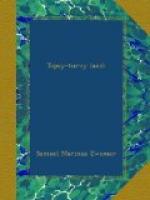“Though my letter bears
date as you view
From the land of the date-bearing
palm
I will palm no more puns upon
you.”
VIII
THE SHEPHERD OF THE SEWING MACHINE
In the blue waters of the Persian Gulf there lies a coral island called Bahrein. At a few hundred yards to the northeast of it is a still smaller island shaped like a pack-saddle, where palm trees and white coral rock houses are reflected in the salt water at high tide. The little island town is called Moharrek, that is, the “Burning Place,” because it is very hot there in summer. After sailing across in a boat one day, and wending our way through a dirty bazar full of flies and Arabs, we were directed to the house of the man called “The Shepherd of the Sewing Machine.” His real name is Mohammed bin Sooltaan, but nobody knows him by any other name or title than Raeee el karkhan, which literally means shepherd of the sewing machine. Let me tell you his story and how he got that queer name.
Years ago, as pilot on the native boats that sail from Bahrein to Bombay, Calcutta, Zanzibar and Jiddah, he had experience of a wider world than the little island where he was born. But the life was a hard one and his wages were small. Moreover, the coming of steamships up the Gulf took away the profit of the sailing craft, and so Mohammed fared from bad to worse. He loved an Arab lass with plaited, well-greased locks of hair and a pleasant face, but her father asked a larger dowry than he could ever pay.
An Arab young man must always pay a good price to the father of his sweetheart before he is allowed to marry her. But this Mohammed was too poor to pay the price asked. What a queer topsy-turvy custom it is for a man to buy his wife just as he buys a horse or a camel! The Arabs often ask how much a wife costs in America and wonder that we are not allowed by the Christian laws to send away our wives and marry others.
Mohammed could not stay at home so he once more went in a ship to Jiddah, the port to Mecca, where pilgrims from all the Moslem world exchange thought and money for bad bread and fanaticism. And yet even here the civilisation of the West tries to enter. Wandering through the bazars Mohammed for the first time saw a sewing machine, in the hands of an Indian tailor. A marvel to the sailor fisherman, indeed!




